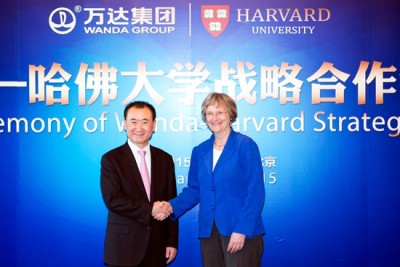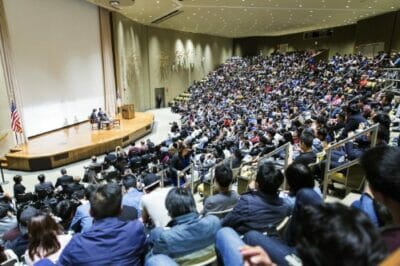
Donation alert: During the Harvard visit, university president Drew Faust named Wang Vice Chair of the school’s Global Advisory Council
Speaking at Harvard University on Thursday China’s richest man, Wang Jianlin, admitted that close relatives of Chinese president Xi Jinping had been shareholders in Dalian Wanda, but credited the commercial property developer’s success to its innovative business model and management skill.
Appearing at a forum at the American Ivy League university, the former soldier turned mall-builder explained that while Xi’s older sister, Qi Qiaoqiao and her husband Deng Jiagui had been investors in Dalian Wanda Commercial Properties, both of them sold their shares before the developer’s record $3.7 billion IPO in December of last year, according to an account in the New York Times.
Wang contended that, since Xi’s relatives apparently gave up a potential windfall by selling their shares before the stock went public, the case proves the Xi administration’s commitment to clean government, as well as Wanda’s independence from government connections.
In explaining the timing and nature of the share disposal, however, Wang may have raised new questions about the use of proxy shareholders by relatives of government officials in China.
Wang Says Xi Relatives Gave Up Wanda Shares in October 2014
The ownership of a substantial stake in Wanda by Xi’s relatives was first reported in a story that appeared in the New York Times in April of this year, tracking Wang’s rise against his relationships with government officials and their families.
Dalian Wanda, which started as a small residential builder in northeast China, grew in less than two decades to become the country’s largest commercial developer, with a portfolio of more than 100 malls across the country. Wanda has also become one of China’s biggest cross-border investors, after buying numerous development projects globally, as well as making such marquee deals as acquiring the AMC theatre chain.
However, Wang is seeking to make clear that his company’s rise had nothing to do with the famous mainland phenomena of “guanxi,” or connections.
“Two months before the listing, Deng sold all the shares held by his investment company and fully exited at a low price point,” Wang was quoted as saying in Caixin.
“This actually proves that it is not corruption, but that President Xi Jinping governs the country strictly, and he manages his family even more strictly,” Wang added. “We owe our rapid growth to our core competence of innovative business model and effective management practices.”
The billionaire said that Deng had bought his shares through his investment company in 2000 as part of a private placement.
Showing Off Your White Gloves

Harvard students attending Wang’s presentation
Unless he has his dates mixed up, however, Wang may have inadvertently revealed a case of shareholding by proxy, involving the share sale by Xi’s relatives.
As the New York Times points out, while Wang indicated that Deng sold his shares in October 2014, according to corporate records, Deng and Qi transferred ownership of the holding company that owned their share to one of their employees in October 2013.
If the power couple only gave up their ownership two months before the IPO, as Wang contends, then it could indicate that the employee was simply holding shares for the politically connected pair as a proxy. This practice, which can shield officials and their relatives from scrutiny, is common in China where it is referred to as a “white glove.”
In all, the Times report had found evidence of shareholding in two companies controlled by Wang by relatives of three other top leaders, in addition to Xi’s family.
Altogether the shareholdings from the four families had a value of more than $1.1 billion when Wanda Commercial Properties listed in Hong Kong last year and theatre chain Wanda Cinema Line listed in Shenzhen in January.
Leave a Reply